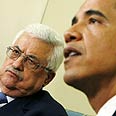
US presents plan for PA to defer UN bid for one year
Washington aims to salvage Mideast crisis aversion plan, suggests PA be allowed to deliver statehood bid to UN but defer acting on it for 12 months
The US and its allies changed tactics on how to avert a crisis over a Palestinian statehood bid, as the White House announced Tuesday that President Barack Obama would meet Palestinian leader Mahmoud Abbas. At the same time, US officials conceded they could not stop Abbas from officially launching his case for the Security Council's approval of the statehood effort.
But they hoped to contain the fallout by urging Abbas not to push for an actual vote in the Council, where the US has promised a veto, to give international peacemakers time to produce a statement that would be the basis for resumed Israeli-Palestinian negotiations.
More on the PA's statehood bid:
- UN vote: Diplomatic blitz in New York
- MK Ben Ari: Establish Palestine in France
- Netanyahu: Beware missile threat
Obama is expected to make a pro forma request to Abbas when they meet Wednesday not to proceed with his initial plan, but also make the case for the Palestinian leader to essentially drop the move for statehood recognition after delivering his letter of intent to the UN, expected Friday.
"The president will be able to say very directly why we believe that action at the United Nations is not the way to achieve a Palestinian state," said Ben Rhodes, the White House deputy national security adviser. He noted that Abbas has indicated his intent to go the Security Council, but said Obama "has made it clear that we do not believe that that will lead to a Palestinian state, that we oppose such efforts."

US President Barack Obama (Photo: AP)
Obama will also meet with Israeli Prime Minister Benjamin Netanyahu on Wednesday.
The new approach would see the Quartet of Mideast peace mediators — the US, European Union, United Nations and Russia — issue a statement addressing both Palestinian and Israeli concerns and setting a timetable for a return to the long-stalled peace talks, officials said.
- For full coverage of PA's statehood bid click here
Israel would have to accept its pre-1967 borders with land exchanges as the basis for a two-state solution, and the Palestinians would have to recognize Israel's Jewish character if they were to reach a deal quickly, officials close to the talks said. The officials spoke on condition of anonymity to discuss ongoing diplomacy.
Mediators less than optimistic
European officials, supported by the United States, were presenting the contours of a compromise agreement to the Israeli and Palestinian governments and asking for tough concessions from each. Officials said several extremely challenging hurdles were leading to some pessimism as to whether mediators would be able to bring Israel and the Palestinians back to the negotiating table, with both sides being pressed to accept positions they've long deemed anathema to their visions of a two-state peace pact.
The difficult diplomacy reflected in some ways the intractability of a dispute that has foiled would-be peacemakers for decades, even though none of the actual elements of a final agreement was being discussed.
Quartet envoys met for a third straight day in New York to come up with a formula that would lead to direct Israeli-Palestinian negotiations. The goal is to reach a comprehensive agreement that would address this week's three major issues, officials said.
The Palestinians would be allowed to deliver their letter of request Friday to the United Nations, but the Palestinians would not act on it for a year or would withdraw it at a later point. That would allow Abbas to save face and prevent an embarrassing defeat that might empower his party's rival faction, Hamas, which is considered a terrorist group by Israel and the United States.
The Palestinians could also go to the UN General Assembly, where they have overwhelming support, but would have to seek instead some form of intermediate upgrade that would stop short of a full recognition of statehood.
And the quartet, with Israel and the Palestinians' advance approval, would give the two sides a year to reach a framework agreement, based on Obama's vision of borders fashioned from Israel's pre-1967 boundary, with agreed land swaps. The statement would also endorse the idea of "two states for two peoples, Jewish and Palestinian," which would be a slightly amended version of Israel's demand for recognition specifically as a "Jewish state."
So far, neither side seemed willing to make such a dramatic concession, officials said. There was also some disagreement among the Quartet with Russia expressing its displeasure with a number of EU and US supported ideas, they said. And they cautioned that the agreement could cause the same conundrum at next year's UN General Assembly meeting if talks fail to advance by then.
- Follow Ynetnews on Facebook
- Receive Ynetnews updates directly to your desktop










